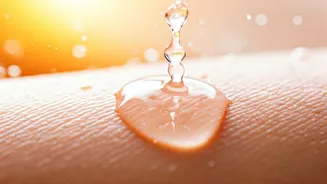The Tap Water Dilemma
Tap water, the everyday staple for many, might not be as harmless as it seems when it comes to skincare. The water that flows from our taps often contains
various impurities, chemicals, and hard minerals. These elements, although considered safe for drinking in most cases, can have adverse effects on the skin. Over time, consistent exposure to these substances can lead to a range of skin issues. It's essential to understand the underlying problems to find effective solutions. This knowledge forms the foundation for making informed choices about your skincare routine and the water you use.
Impurities and Chemicals
Tap water is treated with chemicals like chlorine to kill bacteria and make it safe for consumption. However, these chemicals can strip the skin of its natural oils, leading to dryness and irritation. Furthermore, tap water may contain other impurities such as heavy metals, which can be absorbed by the skin and cause various problems. These impurities include lead and arsenic. These substances can cause premature aging and other dermatological issues. Even small amounts of these substances, over extended periods, can lead to chronic skin damage. Knowing about these common impurities is the first step towards formulating a healthy skincare plan.
Hard Minerals' Effects
Hard water, rich in minerals like calcium and magnesium, is a common issue in many areas. While these minerals are generally safe to drink, they can wreak havoc on the skin. Hard water interferes with the skin's ability to retain moisture, leading to dryness, itchiness, and even eczema flare-ups. Soap and cleansers struggle to lather effectively in hard water, often leaving a residue that clogs pores. This can contribute to acne breakouts and other skin problems. The minerals present in hard water can also alter the skin's pH balance, making it more susceptible to irritation and infections. The ongoing effect of using hard water can significantly reduce the skin's natural defenses.
Skin Types and Harm
The impact of tap water can vary depending on individual skin types. People with sensitive skin are often the most affected, as their skin is more easily irritated by chemicals and hard minerals. Those with dry skin may notice a worsening of their condition due to water's drying effects. Even oily skin can be negatively impacted, as impurities can clog pores and lead to breakouts. Understanding your skin type is essential for deciding what remedies might work best for you. For people with existing skin conditions such as eczema or rosacea, using tap water can exacerbate symptoms. This highlights the importance of customized skincare strategies to protect skin from these water-related problems.
Protecting Your Skin
Thankfully, there are several steps you can take to shield your skin from the negative effects of tap water. Installing a water filter on your showerhead can remove many impurities and chemicals before they reach your skin. Alternatively, washing your face with bottled or filtered water is an effective approach. Choosing gentle, pH-balanced cleansers and moisturizers can also help combat dryness and irritation. Regularly exfoliating your skin can help remove mineral buildup. For those with particularly sensitive skin, consulting a dermatologist can provide personalized recommendations for skincare and suggest products suitable for your skin type. The implementation of these strategies ensures your skin remains healthy and radiant despite the water conditions in your area.













